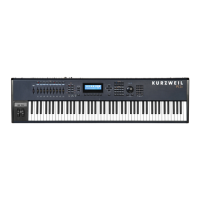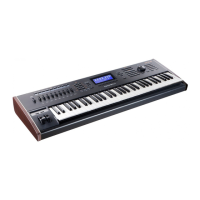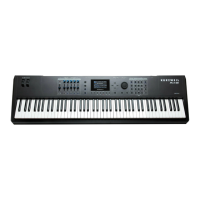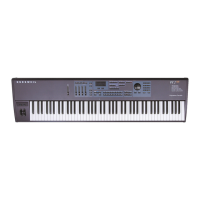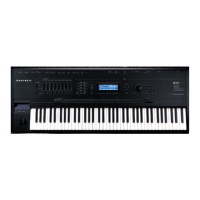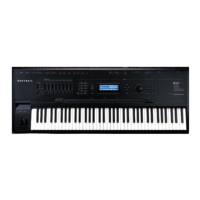Setup Mode
The Setup Editor
7-39
The Human1 through Human4 settings randomly change played note velocity within a range in
order to make arpeggiation sound more human like, with each note varying slightly in velocity.
The Human settings use the velocity received from the first note played as the center of the
randomization range. Each note of the arpeggiator will randomly choose a velocity within the
given range. (See the table below for velocity ranges.)
The Chimp1 through Chimp4 settings function in a similar fashion to the Human settings (see
above.) Like the Human settings, the Chimp settings randomly change played note velocity
within a range, but the Chimp settings have larger randomization ranges. The Chimp settings
use the velocity received from the first note played as the center of the randomization range.
Each note of the arpeggiator will randomly choose a velocity within the given range. (See the
table below for velocity ranges.)
Note: For Human and Chimp modes, if the velocity of the first played note is low enough that the selected
randomization range could result in a velocity of zero, some notes may have a velocity of zero and
therefore produce no sound.
MissNotes1 through MissNotes9 makes the PC3LE randomly miss playing a percentage of
inputted notes. See the table below for percentages and their equivalent settings. Each of these
settings also randomly changes some of the inputted velocities in a range of ± 5, with the
purpose of simulating a more human played sound.
Note: Missed Notes are actually output as notes with a velocity of zero.
Velocity Setting
Velocity
Randomization
Range
Human1 ± 3
Human2 ± 6
Human3 ± 10
Human4 ± 15
Chimp1 ± 25
Chimp2 ± 35
Chimp3 ± 50
Chimp4 ± 64
Velocity Setting
Approximate % of
Notes Missed
MissNotes1 % 10
MissNotes2 % 20
MissNotes3 % 30
MissNotes4 % 40
MissNotes5 % 50
MissNotes6 % 60
MissNotes7 % 70
MissNotes8 % 80
MissNotes9 % 90

